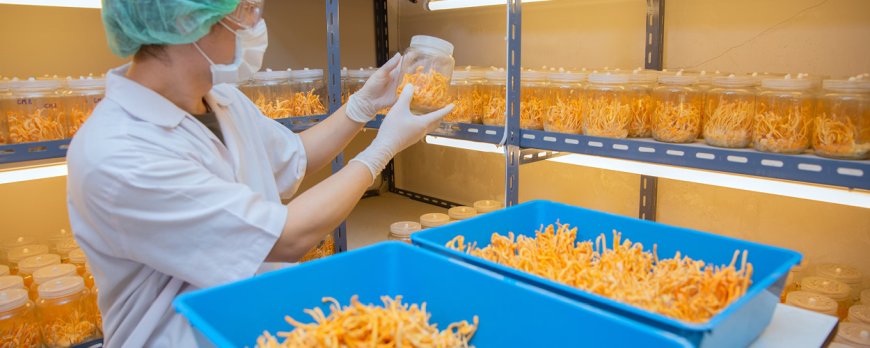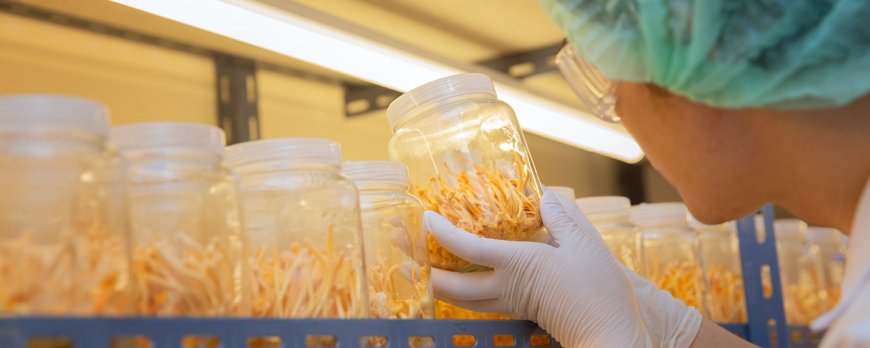Who should avoid taking cordyceps?
Explore our comprehensive guide on 'Who should avoid taking cordyceps?'. Learn essential facts and precautions about this popular supplement.

Who should avoid taking cordyceps?
Cordyceps is generally considered safe for most individuals, but there are certain populations that should avoid its use. It is important to note that cordyceps supplements may have potential side effects, contraindications, and interactions with medications. Therefore, it is essential to exercise caution and consult with a healthcare provider before incorporating cordyceps into your routine.
Key Takeaways:
- Pregnant and breastfeeding individuals should avoid taking cordyceps due to potential safety concerns.
- Cordyceps usage in children is not well-researched, and therefore it is best to avoid administering it to children.
- Individuals with myelogenous type cancers should exercise caution when considering cordyceps supplementation.
- Cordyceps may interact with certain medications, particularly antidiabetic and anticoagulant/antiplatelet drugs. It is crucial to inform your healthcare provider about all medications you are taking before starting cordyceps supplementation.
- Individuals with known allergies to cordyceps or any of its components should refrain from using cordyceps supplements.
- Those with underlying health conditions should consult with their healthcare provider before using cordyceps to ensure its safety and suitability.
- Always seek professional medical advice before starting any new supplement regimen, including cordyceps.

Cordyceps Side Effects and Precautions
While cordyceps is generally well-tolerated, some individuals may experience side effects. It is important to be aware of these potential effects and take necessary precautions when using cordyceps as a supplement. Here are some common side effects and precautions to consider:
- Gastrointestinal Disturbances: Cordyceps may cause mild gastrointestinal discomfort, such as diarrhea or stomach cramps, in some individuals. If you experience these symptoms, it is advisable to reduce the dosage or discontinue use.
- Allergic Reactions: Although rare, some people may be allergic to cordyceps. If you develop symptoms like rash, itching, swelling, or difficulty breathing after taking cordyceps, seek medical attention immediately.
- Blood Clotting and Bleeding: Cordyceps may have a mild anticoagulant effect, potentially increasing the risk of bleeding or interacting with blood-thinning medications. If you are taking anticoagulants or antiplatelet drugs, consult your healthcare provider before starting cordyceps supplementation.
- Drug Interactions: Cordyceps may interact with certain medications, including antidiabetic drugs, potentially affecting blood sugar levels. If you have diabetes or are taking medications to treat diabetes, monitor your blood sugar levels closely when using cordyceps.
It is important to note that these side effects and precautions are not exhaustive, and individual responses to cordyceps supplementation may vary. If you are considering taking cordyceps, it is essential to consult with your healthcare provider to ensure its safety and suitability for your specific health situation.
Cordyceps Contraindications for Pregnant and Breastfeeding Individuals
Pregnant and breastfeeding individuals should avoid taking cordyceps due to limited research on its safety in these populations. While cordyceps supplements are generally regarded as safe for most adults, it is always important to exercise caution when considering any new supplement, especially during pregnancy and lactation.
During this crucial period, the health and well-being of both the mother and the baby are of utmost importance. As of now, there is inadequate scientific evidence to determine the potential risks or benefits of cordyceps supplementation specifically for pregnant and breastfeeding women.
Without sufficient research, it is difficult to establish the safety profile of cordyceps for these populations. Therefore, it is advisable for pregnant and breastfeeding individuals to avoid taking cordyceps supplements, at least until more comprehensive studies are conducted.
Consulting with a healthcare provider is essential to ensure the safety and suitability of any supplement, especially in vulnerable populations such as pregnant and breastfeeding individuals.

Cordyceps and Children
Cordyceps supplements are not recommended for children due to limited evidence on their safety and efficacy in this age group. While cordyceps is generally considered safe for adult use, the same cannot be said for children. It is important to prioritize their well-being and consult with a healthcare provider before considering cordyceps supplementation.
Children have unique physiological and developmental needs, and the effects of cordyceps on their growing bodies are not well understood. Limited research exists on the specific safety and efficacy of cordyceps in children, making it difficult to establish appropriate dosage recommendations or potential risks. As a result, it is best to err on the side of caution and refrain from giving cordyceps to children.
If you are considering using cordyceps for your child, it is crucial to consult with a healthcare provider first. They can assess your child's individual health needs, potential risks, and recommend alternative approaches or supplements that may be more suitable for their age group. Always prioritize the guidance of a medical professional when making decisions about your child's health.
Cordyceps and Individuals with Myelogenous Type Cancers
Individuals with myelogenous type cancers should avoid cordyceps supplementation due to limited evidence on its safety and potential interactions with cancer treatments. Myelogenous type cancers, including types like acute myeloid leukemia (AML) and chronic myelogenous leukemia (CML), are a group of blood and bone marrow cancers. While cordyceps has been studied for its potential health benefits, there is not enough research specifically focused on its use and effects in individuals with myelogenous type cancers.
Cordyceps is known to have immune-enhancing and anti-inflammatory properties, which might seem beneficial for cancer patients. However, some studies suggest that cordyceps may have potential interactions with cancer treatments, such as chemotherapy or targeted therapies. Due to the lack of comprehensive studies, it is essential for individuals with myelogenous type cancers to consult with their healthcare provider before considering cordyceps supplementation.
When it comes to cancer treatments, it is crucial to prioritize evidence-based practices and ensure the safety and efficacy of any supplements or alternative therapies. Therefore, it is recommended that individuals with myelogenous type cancers refrain from using cordyceps supplements until further research is conducted to establish its safety and potential interactions with cancer treatments.
Cordyceps Interactions with Medications
Cordyceps may interact with certain medications, and individuals taking these medications should exercise caution. It is important to consult with a healthcare provider before starting cordyceps supplementation, especially if you are currently taking antidiabetic or anticoagulant/antiplatelet drugs.
If you are using antidiabetic medications, cordyceps may enhance their effects, leading to lower blood sugar levels. This can be especially dangerous for individuals with diabetes or those on insulin therapy. Close monitoring of blood sugar levels is recommended when using cordyceps alongside antidiabetic medications, and adjustments to medication dosage may be necessary.
In the case of anticoagulant/antiplatelet drugs, cordyceps may have a mild anticoagulant effect. This means it may further thin the blood and increase the risk of bleeding or bruising. If you are taking medications such as warfarin, aspirin, or clopidogrel, it is essential to discuss cordyceps supplementation with your healthcare provider to ensure your safety.
Remember, cordyceps can have potential interactions with medications, so it is crucial to inform your healthcare provider about all the supplements and medications you are currently taking. They can provide personalized advice and guidance based on your specific health conditions and medications.

Cordyceps allergies and safety concerns
While rare, some individuals may be allergic to cordyceps, and safety concerns should be considered before using this supplement. Allergic reactions to cordyceps can include symptoms such as rash, itching, swelling, dizziness, and difficulty breathing. It is important to discontinue use and seek medical attention if any allergic reactions occur.
In addition to allergies, other safety concerns should be taken into account when considering cordyceps supplementation. Due to limited research, pregnant and breastfeeding individuals should avoid taking cordyceps supplements. The potential effects on the developing fetus or infant are unknown. Similarly, cordyceps use in children is not recommended, as there is insufficient evidence regarding its safety and effectiveness in this age group.
Individuals with myelogenous type cancers should also exercise caution when it comes to cordyceps. While cordyceps has been traditionally used to support certain types of cancer treatment, there is a lack of scientific evidence to establish its safety and efficacy for individuals with myelogenous type cancers. It is best to consult with an oncologist or healthcare provider before incorporating cordyceps into the treatment regimen.
Precautions:
- Avoid cordyceps if you have known allergies to fungi or mushroom products.
- Consult with a healthcare provider before taking cordyceps if you are pregnant, breastfeeding, or have a history of myelogenous type cancers.
- If you experience any allergic reactions or adverse effects while taking cordyceps, discontinue use and seek medical attention immediately.
- Always follow the recommended dosage and do not exceed the recommended intake of cordyceps supplements.
Remember, cordyceps may interact with certain medications, especially antidiabetic drugs and anticoagulant/antiplatelet medications. It is essential to inform your healthcare provider about all the medications you are taking to avoid any potential interactions or adverse effects. Consulting with a healthcare professional before starting cordyceps supplementation is crucial to ensure your safety and overall well-being.

Cordyceps Health Risks and Health Conditions
Individuals with certain health conditions should consult with their healthcare provider before taking cordyceps due to potential risks. While cordyceps is generally considered safe for most people, it is important to exercise caution if you have specific medical conditions.
1. Autoimmune Disorders:
If you have an autoimmune disorder, such as rheumatoid arthritis or lupus, it is advisable to seek medical advice before incorporating cordyceps into your routine. Cordyceps may stimulate the immune system, which could potentially exacerbate symptoms or interfere with medications used to manage autoimmune conditions.
2. Bleeding Disorders:
If you have a bleeding disorder, such as hemophilia or are taking anticoagulant/antiplatelet medications, it is crucial to consult with your healthcare provider before using cordyceps. Cordyceps may have anticoagulant properties and could increase the risk of abnormal bleeding or affect the effectiveness of certain medications.
3. Diabetes:
If you have diabetes or are taking antidiabetic medications, it is important to discuss cordyceps supplementation with your doctor. Cordyceps has been linked to potential blood sugar-lowering effects, which may require adjustments to your diabetes management plan to prevent hypoglycemia.
4. Organ Transplant Recipients:
If you have received an organ transplant or are on immunosuppressive medications, it is crucial to consult your healthcare provider before using cordyceps. Cordyceps may stimulate the immune system, which could potentially interfere with the effectiveness of immunosuppressive drugs.
Remember, this list is not exhaustive, and it is important to have an open and honest conversation with your healthcare provider before starting any new supplement or making changes to your existing health routine. They will be able to provide personalized guidance based on your specific health conditions and medical history.
Conclusion
Before considering cordyceps supplementation, it is crucial to understand the potential risks and contraindications, and to consult with a healthcare provider for personalized advice.
Certain populations, including pregnant or breastfeeding individuals, children, and individuals with myelogenous type cancers, should avoid taking cordyceps supplements due to safety concerns and lack of sufficient evidence regarding its safety and efficacy in these groups.
In addition, cordyceps may interact with certain medications, such as antidiabetic and anticoagulant/antiplatelet drugs. It is important to discuss the use of cordyceps with a healthcare provider to ensure safety and suitability.
In summary, cordyceps supplementation may carry potential risks and precautions, especially for specific populations and individuals on certain medications. Consulting with a healthcare provider is essential to make informed decisions about cordyceps usage and to prioritize personal health and well-being.































































































































